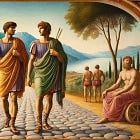The duldrums, we might call it. Or malaise. Maybe we can’t put our finger on what’s wrong, but something’s not right.
We’re unsatisfied, vaguely anxious, and unsure what to do.
This is the complaint the Roman knight Annaeus Serenus brought to his teacher, the philosopher Seneca, in On Tranquility of the Mind.
Serenus had a lot going for him. He held considerable power as the prefect of the Vigiles Urbani , Rome’s night watch and fire brigade. This implies that he was trusted by the emperor Nero, and might go far in life.
Yet Serenus complains he…
Is tempted by success and prestige, but finds them unsatisfying when he achieves them.
Starts doing one thing, but soon tires of it and wants to go in another direction.
Is satisfied with frugal habits when alone, but with big-spending friends he’s unsure if his simple life is enough.
Longs for withdrawal and contemplation, but feels restless and unsatisfied when away from the hustle of Rome’s movers and shakers.
He seems apologetic for bringing this up because things are ostensibly fine in his life. Not storm-tossed, yet seasick, is how he puts it. “…it is not so much that we are unhappy as that we are not happy enough.”
Most of us have been there once or more. It’s practically a rite of passage to feel you're trapped in an inescapable funk at some point.
Serenus begs Seneca to tell him, “if you have any remedy by which you could stop this fluctuation of mine.”
The fix is as impactful today as it was in the 1st century A.D.
Seneca’s Fix
Seneca builds his reply around Serenus’s dissatisfaction and fluctuations. He suggests tools for identifying a middle way of tranquility amid the world’s turbulence and its many divergent temptations.
You might enjoy reading Seneca’s full reply, but I’d like to focus on some of his specific solutions and add my own thoughts.
Can Flux Be the Solution?
We’ll begin at the end.
After advising Serenus on a course of action, Seneca concludes that it’s not flux per se that’s the problem. We don’t need to be hide-bound and unvaringly regimented, nor always serious and devoted to work. In fact, some degree of flux may be incredibly important for breaking out of the doldrums.
He cites wise men who like to dance and drink, and notes Aristotle saying, “no great genius has existed without a strain of madness,” the sort that comes about when we let loose.
“When [the mind] despises common and routine things and rises more loftily with divine inspiration, then and only then does it intone something greater than mortal speech… it ought to desert its customary mode and be borne away and bite the bridle and carry off its rider and bear him where he feared to rise.”
Seneca saves this part for the end because he knows people tempted by inconstancy will use it as an excuse to make poor choices. They’re already tempted to be spiritual but not religious, and are happy to compound their problems with additional floundering in all domains if given an excuse.
Flux is the spice, not the main meal. But for the people who live in straitjackets, flux might be the cure.
So it’s worth asking:
Are you practicing awe?
A Change of Scenery:
Serenus craves change, but Seneca has some bad news for him — wherever you go, there you are. If you’re miserable in one place or circumstance, you’ll probably be miserable in your next situation soon enough.
Or, as Seneca wrote elsewhere:
“You must change your mind, not the sky: though you may cross the sea, though you may flee to the ends of the earth, your troubles follow you.” — Seneca, Letters, 28.1
Change is often sensible. But the hope that different circumstances will fix problems originating in our skulls is a timeless delusion.
Know Thyself
“you need…to have faith in yourself and believe you are following the right path, not letting yourself be diverted by the cross tracks of many people running hither and yon, and of some who even wander around the path itself.”
Seneca reminds Serenus that he’s already improved his life by embracing philosophy (which Serenus admitted earlier), and so should have some faith in the process, which takes time. Peole running after whims, always changing and onto something new — and occasionally inspiring envy from those on better paths— are often not doing as well as they seem.
For modern people without a system of ethics and tools for decision making, this won’t mean much. They might feel like they’re the miserable ones running around like lemmings.
But there’s a layer of “know thyself,” embedded here, and it applies to everyone. Seneca wants us considering how choices and temptations align or diverge from our principles (do we know what they are?). Reliably living up to our standards brings steady contentment. If we have no idea what’s best, we shouldn’t be surprised that we can’t decide what to do. Misery and vascilation are reasonable expectations if we have no personal standards. We can’t confidently set a path without a compass, much less stick to it.
But even when we know what’s right, temptations and alternate paths always beckon. If you determine one isn’t best, but are tempted anyway, philosophy supplies several tools:
Horace’s Wedge is one great option (fighting FOMO).
Decomposition is another (seeing the dark side of desires.)
Extremes:
Seneca acknowledges that extremes are tempting. We want retirement/vacation/freedom from responsibilities, but relentlessly putting our noses to the grindstone and being “in the mix” might call to us too.
If you give in to one extreme or the other, you might end up in some sad places, like pot-smoking Fire Guy.
The solution isn’t demonizing one or the other. We can use our principles to focus on the type of action rather than obsessing over scope and impact.
What type of action? Justice is the thread we should try to stitch through all our lives.
“when a man resolves to make himself useful to his fellow citizens and mankind, he both exercises and advances, by setting himself in the midst of public services and administering both shared and private business according to his capacity.”
With this common thread running through us, we can pursue it in the middle or on the extremes, as reason and circumstances dictate.
I write this piece alone, but perhaps it will help a few fellow humans. Later, I will be among people, teaching and learning and helping. Neither is wrong. They’re sides of the same coin.
Never Stop Doing Good:
In advice many historians think is aimed at himself, Seneca suggests those forced from the limelight should not give up on positively affecting the world. Despair over such “downshifts,” in life circumstance will lead us to dark places.
Instead…
“[He should] selectively find some activity in which he can be useful to the state. He is not allowed to serve as a soldier; then let him seek office. He must live as a private citizen; let him be an advocate. He is enjoined to silence; then let him benefit his citizens with his silent encouragement. Is it dangerous even to enter the forum? Let him play the good companion and loyal friend and moderate guest in private homes, at the games, and at parties. Has he lost the duties of a citizen? Then let him perform those of a human being.”
Choose Friends Wisely
Don’t keep bad company. The unsettled will likely unsettle you and draw you away from a good road.
“it is the beginning of disease to mix healthy elements with sickness. Yet I would not advise you to follow or draw to yourself no one except a wise man. For where will you find that person whom we have been seeking for so many ages? Let the least bad serve as the best.”
Money
Don’t make money in ways you’re ashamed of. And see if you can drag your money making activities into the light with virtue.
Seneca’s take on money is:
“…the best measure of money is one that neither sinks into poverty nor departs far from it.”
But keep in mind that he was loaded, so make of this what you will.
Walk It Off:
“The mind is refreshed by walking…”
All these solutions are the big picture, but when in immediate need, I admit to having a secret weapon against my troubles that Seneca certainly knew of: walking.
As the miles go by, I seem to leave my troubles behind, bit by bit. It’s a therapy of the legs baked into us by millennia of evolution. Our anxieties, uncertainties, and anger spool down as our brain waves shift us away from rumination and into inspiration and perspective.
Since I’ve already written an ode to walking’s many benefits, I’ll simply leave that here:
Thanks for reading Socratic State of Mind.
If you liked this article, please like and share it, which helps more readers find my work. I’d also love to hear what you think in the comments below.





What strikes me most is how valuable motion is--most of "feeling" stuck comes from actually "being" stuck! It's self-evident, but as you point out in this article, it's worth repeating! Just like being caught in a rip-tide, the best way out can be to not swim back to shore, but to move in a different direction!
When you can let go of control and let yourself flow, you find out just how little control you actually had.